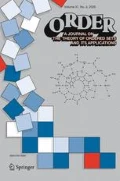Abstract
We prove the following theorem. Suppose that M is a trim DFA. Then \(\mathcal{L}(M)\) is well-ordered by the lexicographic order < ℓ iff whenever the non sink states q, q.0 are in the same strong component, then q.1 is a sink. It is easy to see that this property is sufficient. In order to show the necessity, we analyze the behavior of a < ℓ-descending sequence of words. This property is used to obtain a polynomial time algorithm to determine, given a DFA M, whether \(\mathcal{L}(M)\) is well-ordered by the lexicographic order. Last, we apply an argument in Bloom and Ésik (Fundam Inform 99:383–407, 2010, Int J Found Comput Sci, 2011) to give a proof that the least nonregular ordinal is ω ω.
Similar content being viewed by others
References
Adamek, J.: Free algebras and automata realizations in the language of categories. Comment. Math. Univ. Carol. 15, 589–602 (1974)
Bloom, S.L., Choffrut, C.: Long words: the theory of concatenation and ω-power. Theor. Comp. Sci. 259, 533–548 (2001)
Bloom, S.L., Ésik, Z.: Deciding whether the frontier of a regular tree is scattered. Fundam. Inform. 11, 1–22 (2003)
Bloom, S.L., Ésik, Z.: A Mezei–Wright theorem for categorical algebras. Theor. Comp. Sci. 411, 341–359 (2010)
Bloom, S.L., Ésik, Z.: Algebraic linear orderings. Int. J. Found. Comput. Sci. 22(2), 491–515 (2011)
Bloom, S.L., Ésik, Z.: Algebraic ordinals. Fundam. Inform. 99, 383–407 (2010)
Cormen, T.H., Leiserson, C.E., Rivest, R.L., Stein, C.: Introduction to Algorithms, 3rd edn. The MIT Press, Cambridge (2009)
Courcelle, B.: A representation of trees by languages. Theor. Comp. Sci. 6, 255–279 and 7, 25–55 (1978)
Courcelle, B.: Fundamental properties of infinite trees. Theor. Comp. Sci. 25, 95–169 (1983)
Delhommé, Ch.: Automaticity of ordinals and of homogeneous graphs. C. R. Math. Acad. Sci. Paris 339(1), 5–10 (2004, in French)
Heilbrunner, S.: An algorithm for the solution of fixed-point equations for infinite words. RAIRO Inform. Theor. Appl. 14, 131–141 (1980)
Ésik, Z.: Scattered Context-Free Linear Orderings. arXiv:1102.0850v2 (2011)
Rabin, M.: Decidability of second-order theories and automata on infinite trees. Trans. Am. Math. Soc. 141, 1–35 (1969)
Wand, M.: Fixed point constructions in order-enriched categories. Theor. Comp. Sci. 8, 13–30 (1979)
Author information
Authors and Affiliations
Corresponding author
Rights and permissions
About this article
Cite this article
Bloom, S.L., Zhang, Y.D. A Note on Ordinal DFAs. Order 30, 151–164 (2013). https://doi.org/10.1007/s11083-011-9233-1
Received:
Accepted:
Published:
Issue Date:
DOI: https://doi.org/10.1007/s11083-011-9233-1



